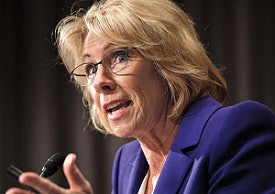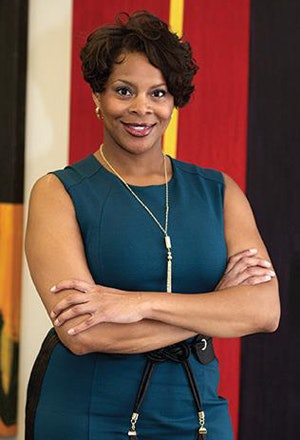The release of proposed regulations for Title IX and campus assault, the federal law that prohibits sex and gender-based discrimination in public schools around the country, has caused growing concerns among higher education observers.
 Betsy DeVos
Betsy DeVosThe proposed regulations redefine sexual harassment under Title IX and set new standards for how schools should respond to sexual harassment reports and what it means for a student to report the misconduct.
“Throughout this process, my focus was, is, and always will be on ensuring that every student can learn in a safe and nurturing environment,” said U.S. Secretary of Education Betsy DeVos. “That starts with having clear policies and fair processes that every student can rely on. Every survivor of sexual violence must be taken seriously, and every student accused of sexual misconduct must know that guilt is not predetermined.”
Some of the proposed Title IX regulations establishes a more narrow definition of sexual harassment. In order for a school to respond to a report, the sexual assault had to have occurred in the United States (outlawing study abroad programs). Additionally, the school must have actual knowledge of the alleged harassment and the alleged harassment must involve conduct that happened within the school’s own program or activity.
The proposed regulations would also require schools to respond fairly and meaningfully to all reports of sexual harassment and provide supportive measures to victims; and permit cross-examination between both parties through an adviser after a report has been filed.
Many schools do not have this cross examination process in effect, which would place a significant administrative burden on the schools and would require additional staff training that could be very expensive, said Bisi Okubadejo, a lawyer at Ballard Spahr LLP, adding that the process could also potentially dissuade some students from making reports if they believe there will be an examination portion during the resolution process.
In addition, if one or both parties are unable to secure an adviser, one would be assigned to them, which would be significant if the proposed regulations are adopted, said Dr. Shafiqa Ahmadi, associate professor of clinical education at University of Southern California at Rossier and co-director for the Center for Education, Identity and Social Justice.
“Essentially we’re bringing criminal proceedings to a civil rights case and higher education is not a place for criminal proceedings, it never has been,” Ahmadi added. “When we’re talking about the criminal justice system, when we’re looking at the criminal justice system outside of an educational institution, it’s very distinctive, very different and we know that the hostility that comes with this type of regulation on a college campus is that a college is supposed to be safe place … it’s no longer a safe environment or a safe space for survivors of sexual assault,” she said.
Many education and student-based organizations, survivor advocates and higher education faculty and administrators have voiced mixed opinions regarding the proposed adjustments and what they would mean for sexual assault victims.
“I was deeply disappointed on behalf of all survivors,” said Dr. Penny R. Smith, president and CEO of Alegria Technologies, LLC and a sexual assault survivor. Smith said the proposed definition of sexual misconduct as an incident that is “so severe, pervasive and objectively offensive” will foster a “culture of underreporting” on higher education campuses.
 Dr. Penny Smith
Dr. Penny SmithSeventy percent of campus rapes are between acquaintances, Smith added.
“We’re not looking at a stranger rape where someone is likely to have endured injuries or other physical evidence of rape,” she cautioned.
Research shows that individuals who experience assaults on campus may have a history of being sexually violated prior to arriving at college, Smith said, noting that the new Ed Department regulations are “setting up a person who is disabled psychologically and physiologically by their trauma” to adhere to a narrow definition of sexual misconduct.
Dr. Allia Abdullah-Matta, associate professor of English at CUNY LaGuardia Community College, called the proposed ruling “problematic.”
“Young women, and young men as well, they’re not as quick to report. It’s going to make it more difficult for them to get fair treatment and also for their accuser to be punished,” she said. “I would imagine it’s going to reduce the percentage of people that report without a larger support system off the campus.”
In a time where sexual harassment has been more openly discussed in schools and the workplace under movements like #MeToo, researchers have found that only 2-10 percent of sexual assault victims have made false accusations.
The proposal does not go into effect immediately, allowing a 60-day period beginning Nov. 16 for the public to submit their comments about the rules in writing.
Shiwali G. Patel, senior counsel at the National Women’s Law Center, told Diverse she’s concerned with the time frame.
“In light of the holiday season that’s coming up and winter break,” this “would really narrow the timeframe that students and school faculty and administrators have to comment,” Patel said. She added that her organization is working with mother groups to galvanize a response.
After the comment period ends, the department’s political appointees will determine if the proposal needs any additional adjustments, which will likely take several months to accomplish.
The Association of Public and Land-grant Universities (APLU) said that affiliated institutions will be taking a “very close and careful look” at the Department’s proposed rule and will submit comments that “reflect the views of public universities.”
“When cases of sexual assault or harassment do tragically occur, universities must continue to diligently work to ensure survivors have the full support and resources they need and are treated with the respect and dignity they deserve. Universities are also committed to ensuring a student disciplinary process that is fair to all involved. For public universities, our obligations are both ethical and constitutional,” the APLU statement said in part. “We fully expect that public universities will continue to work hard to far exceed what’s minimally expected in Title IX rules to support survivors while also ensuring due process for the accused.”
Monica Levitan can be reached at [email protected]. Executive Editor Jamal Watson and staff writer Tiffany Pennamon contributed to this report.



















